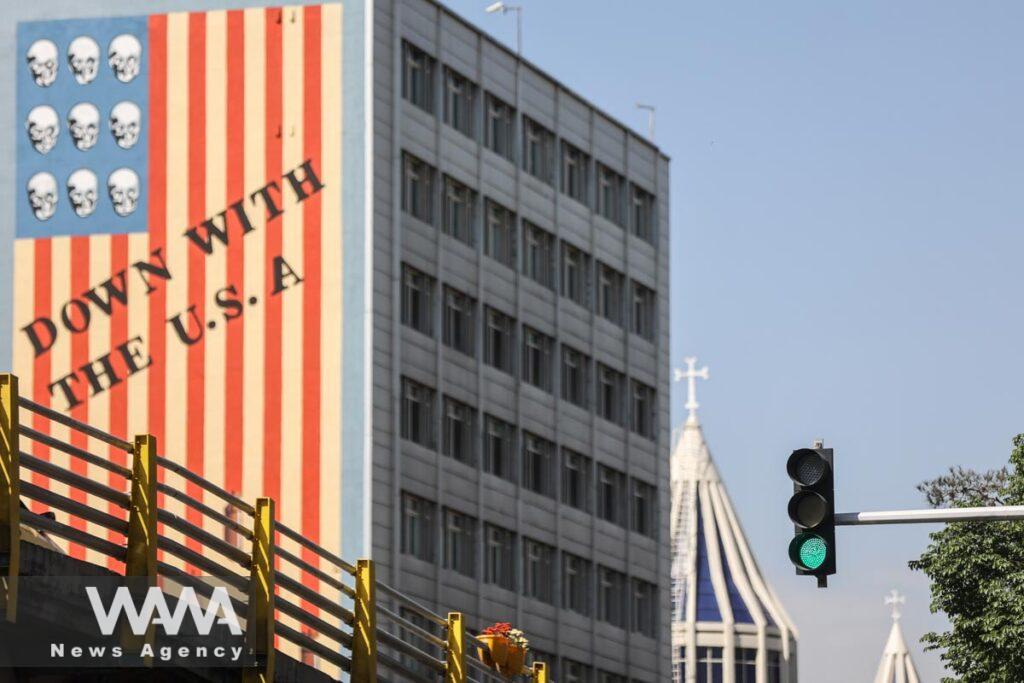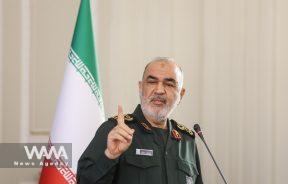Iran Talks Tough as U.S. Returns to the Table
WANA (May 15)- During a visit to the Tehran International Book Fair, Iran’s Foreign Minister Seyed Abbas Araghchi made pointed remarks regarding ongoing negotiations between Tehran and Washington. His statements come at a time when indirect talks between Iran and the United States, facilitated by Omani intermediaries, have resumed with renewed urgency following recent developments in the region. Araghchi’s tone signaled both openness to economic engagement and an unshakable defense of Iran’s nuclear rights.

An Iranian newspaper with a cover photo of Iran’s Foreign Minister Abbas Araqchi is seen in Tehran, Iran, April 26, 2025. Majid Asgaripour/WANA (West Asia News Agency)
“We do not have any ban on the economic presence of American companies in Iran. This ban was imposed by the Americans themselves,” Araghchi stated. His comment subtly invited the possibility of U.S. businesses entering the Iranian market—if Washington lifts its sanctions regime. This aligns with Iran’s strategy of leveraging the promise of economic cooperation to push back against the “maximum pressure” legacy of the Trump administration. However, this opening was quickly tempered by his assertion of Iran’s red lines in the nuclear talks.
The minister reaffirmed Iran’s demand for the full removal of sanctions, offering in return what he called “transparency and confidence-building measures.” While not elaborating on these measures, the phrasing suggests that Tehran may be willing to allow broader IAEA access or limit enrichment levels under a revised deal, provided its sovereignty and technological capacity remain intact. But he left no room for doubt regarding Iran’s position on enrichment: “The Iranian people’s nuclear rights also include the right to enrichment… we will not abandon them, and we will not shut down any enrichment facilities.”
In perhaps his most defiant remark, Araghchi addressed the military threat posed by the U.S. and Israel, saying, “If they were able to destroy our nuclear facilities militarily, there would be no need for them to enter into negotiations… they are not able to impose their will militarily.” This reflects Tehran’s view that diplomacy has become the West’s only viable path—not out of goodwill, but due to strategic limitations. It was also a signal to domestic audiences that Iran is negotiating from a position of strength, not submission.
These remarks come amid a broader recalibration of U.S. Middle East policy under the current administration. While Washington seeks to contain regional escalation, especially in Gaza and the Red Sea, it is also trying to prevent Iran from advancing its nuclear program beyond the 60% enrichment threshold. Talks remain fragile and complicated by Iran’s ties with Russia and its recent drone and missile exchanges with Israel. In this context, Araghchi’s message is clear: Iran is willing to talk, but not at the cost of its strategic assets or national pride.

A traffic light is seen next to an anti-U.S. mural on a building in Tehran, Iran, April 19, 2025. Majid Asgaripour/WANA (West Asia News Agency) via REUTERS ATTENTION EDITORS – THIS PICTURE WAS PROVIDED BY A THIRD PARTY
In response to these developments, U.S. President Donald Trump, during his recent Gulf tour, expressed cautious optimism about the negotiations. He stated that Iran has “sort of” agreed to the terms of a new nuclear agreement, emphasizing that the country must not acquire nuclear weapons. Trump confirmed that indirect negotiations are progressing, referring to recent talks in Oman where U.S. envoy Steve Witkoff presented a proposal to Iranian Foreign Minister Abbas Araghchi.
Iran’s determination to retain its enrichment capabilities and the U.S.’s call for strict restrictions show a profound lack of trust that we are all familiar with. While discussions persist, the global community observes attentively, optimistic that diplomatic efforts will triumph over conflict.












